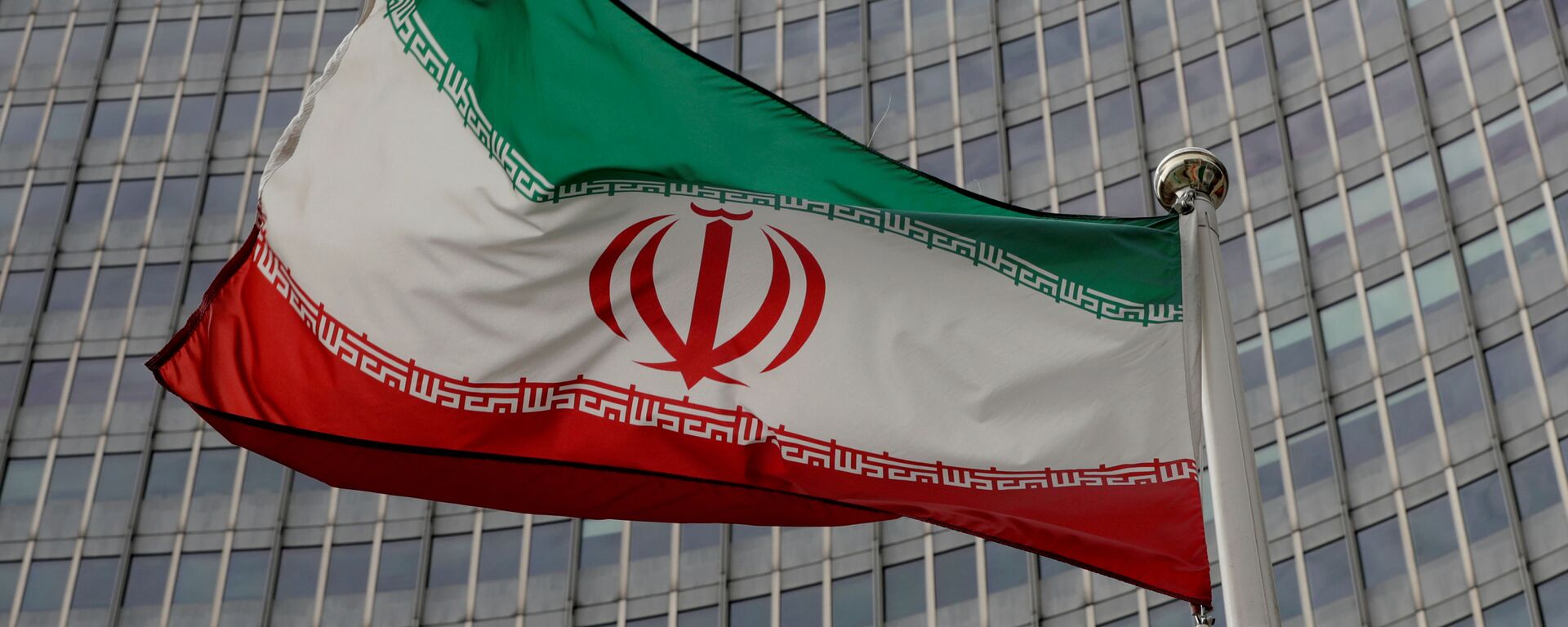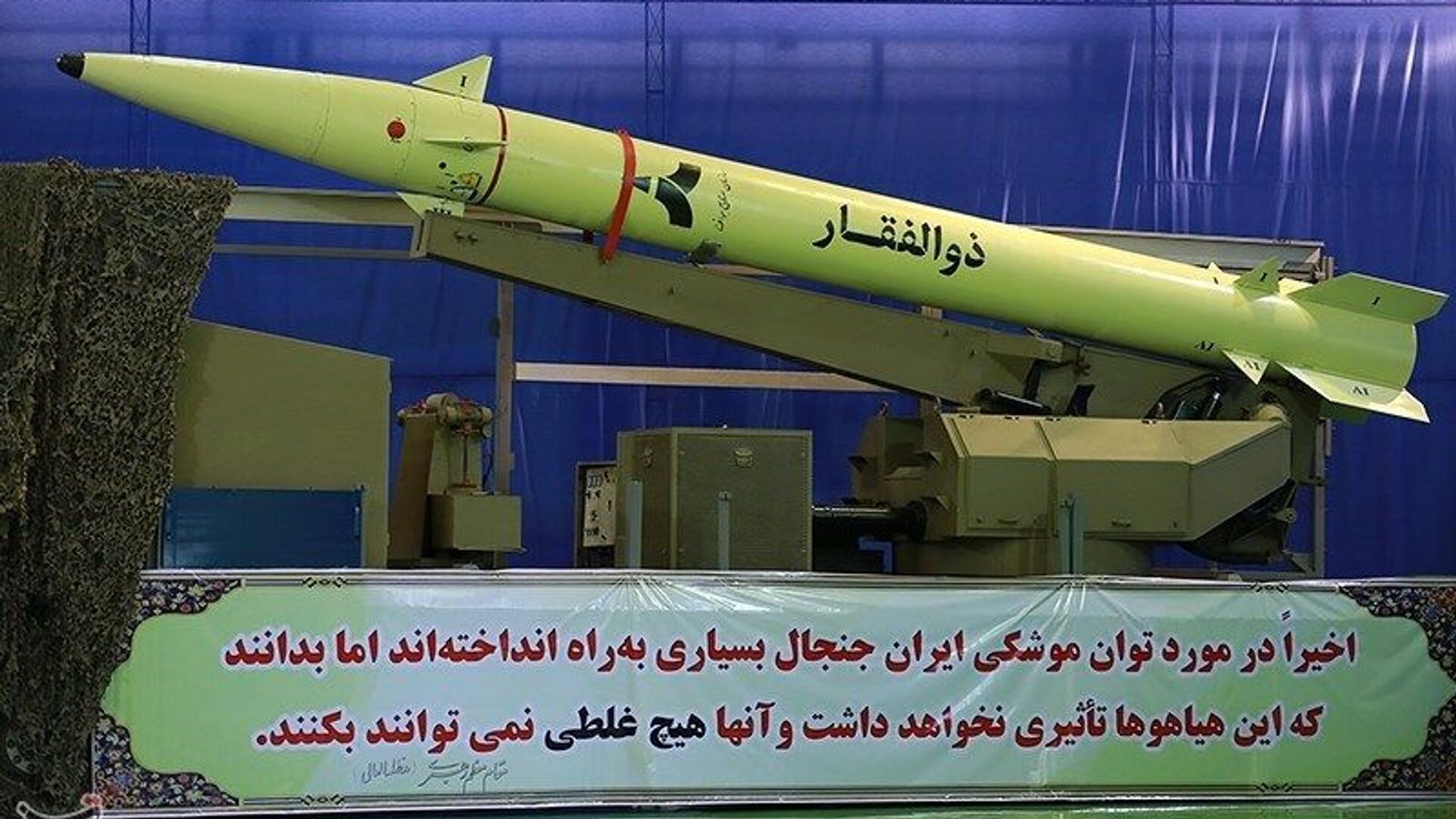https://sputnikglobe.com/20220107/iran-showcases-short-range-ballistic-missiles-amid-vienna-talks-on-jcpoa--1092095581.html
Iran Showcases Short-Range Ballistic Missiles Amid Vienna Talks on JCPOA
Iran Showcases Short-Range Ballistic Missiles Amid Vienna Talks on JCPOA
Sputnik International
Three Iranian short-range ballistic missiles have been put on display in central Tehran, with the country's Islamic Revolutionary Guard Corps describing them as already-known models
2022-01-07T14:15+0000
2022-01-07T14:15+0000
2022-08-06T13:27+0000
sanctions
iran
talks
deal
joint comprehensive plan of action (jcpoa)
ballistic missiles
us
https://cdn1.img.sputnikglobe.com/img/107904/63/1079046318_0:54:801:504_1920x0_80_0_0_cbf9723ff1e79e0923fe209d2a0116a7.jpg
Three Iranian short-range ballistic missiles have been put on display in central Tehran, with the country's Islamic Revolutionary Guard Corps describing them as already-known models.The showcase of the missiles, known as Dezful, Qiam, and Zolfaghar with official ranges of up to 1,000 kilometres (620 miles), come amid the ongoing Vienna talks on the revival of the 2015 Iran nuclear deal, also known as the Joint Comprehensive Plan of Action (JCPOA).The latest round of talks on the JCPOA began in the Austrian capital after a short pause on Monday, with the US State Department reportedly saying that Iran should "add real urgency" to the Vienna negotiations or risk losing any chance of the accord being revived.Last month, Iranian Foreign Ministry spokesman Saeed Khatibzadeh said that the US hadn't made any suggestions that could lead to the revival of the JCPOA or the drafting of a new deal during the five-way talks in Vienna.In 2015, Iran signed the JCPOA with the P5+1 group of countries — the US, China, France, Russia, the UK plus Germany — and the EU. The agreement obligated Tehran to scale back its nuclear programme and significantly decrease its uranium reserves in exchange for sanctions relief, including the lifting of an arms embargo five years after the deal's adoption.In May 2018, the US unilaterally withdrew from the deal and reimposed sanctions on Iran, prompting Tehran a year later to announce that it was starting to scale back its own JCPOA commitments. The Biden administration signalled its readiness to return to the agreement, with Iran saying that the White House should first scrap all sanctions against the Islamic Republic.Tehran has repeatedly resisted US and European pressure to reduce its missile power, underscoring the need to defend itself against foreign aggression and saying that Iran's missile programme "cannot and will not be negotiated".The Islamic Republic is known to possess more than 1,000 short- and medium-range missiles, and is reported to have ramped up its development and production following the US exit from the JCPOA.
https://sputnikglobe.com/20211214/us-fully-prepared-to-lift-sanctions-inconsistent-with-jcpoa-commitments---us-envoy-to-un-1091525207.html
iran
Sputnik International
feedback@sputniknews.com
+74956456601
MIA „Rosiya Segodnya“
2022
Oleg Burunov
https://cdn1.img.sputnikglobe.com/img/07e4/09/0b/1080424846_0:0:2048:2048_100x100_80_0_0_3d7b461f8a98586fa3fe739930816aea.jpg
Oleg Burunov
https://cdn1.img.sputnikglobe.com/img/07e4/09/0b/1080424846_0:0:2048:2048_100x100_80_0_0_3d7b461f8a98586fa3fe739930816aea.jpg
News
en_EN
Sputnik International
feedback@sputniknews.com
+74956456601
MIA „Rosiya Segodnya“
Sputnik International
feedback@sputniknews.com
+74956456601
MIA „Rosiya Segodnya“
Oleg Burunov
https://cdn1.img.sputnikglobe.com/img/07e4/09/0b/1080424846_0:0:2048:2048_100x100_80_0_0_3d7b461f8a98586fa3fe739930816aea.jpg
iran, us, ballistic missiles, jcpoa
iran, us, ballistic missiles, jcpoa
Iran Showcases Short-Range Ballistic Missiles Amid Vienna Talks on JCPOA
14:15 GMT 07.01.2022 (Updated: 13:27 GMT 06.08.2022) The missiles were showcased a few days after the latest round of talks on the revival of the 2015 Iran nuclear deal kicked off in Vienna. The US State Department reportedly said that Iran should "add real urgency" to the negotiations or risk losing any chance of the accord being revived.
Three Iranian short-range ballistic missiles have been put on display in central Tehran, with the country's Islamic Revolutionary Guard Corps describing them as already-known models.
The showcase of the missiles, known as Dezful, Qiam, and Zolfaghar with official ranges of up to 1,000 kilometres (620 miles), come amid the ongoing Vienna talks on the revival of the 2015 Iran nuclear deal, also known as
the Joint Comprehensive Plan of Action (JCPOA).
The latest round of talks on the JCPOA began in the Austrian capital after a short pause on Monday, with the US State Department reportedly saying that Iran should "add real urgency" to the Vienna negotiations or risk losing any chance of the accord being revived.
Last month, Iranian Foreign Ministry spokesman Saeed Khatibzadeh said that the US hadn't made any suggestions that could lead to the revival of the JCPOA or the drafting of a new deal during the five-way talks in Vienna.
Iran expects the US to "offer a tangible text", in which case an agreement can be reached "in the shortest possible time", the spokesman said.
In 2015, Iran signed the JCPOA with the P5+1 group of countries — the US, China, France, Russia, the UK plus Germany — and the EU. The agreement obligated Tehran to scale back its nuclear programme and significantly decrease its uranium reserves in exchange for sanctions relief, including the lifting of an arms embargo five years after the deal's adoption.
In May 2018, the US unilaterally withdrew from the deal and reimposed
sanctions on Iran, prompting Tehran a year later to announce that it was starting to scale back its own JCPOA commitments. The Biden administration signalled its readiness to return to the agreement, with Iran saying that the White House should first scrap all sanctions against the Islamic Republic.

14 December 2021, 20:49 GMT
Tehran has repeatedly resisted US and European pressure to reduce its missile power, underscoring the need to defend itself against foreign aggression and saying that Iran's missile programme "cannot and will not be negotiated".
The Islamic Republic is known to possess more than 1,000 short- and medium-range missiles, and is reported to have ramped up its development and production following the US exit from the JCPOA.





